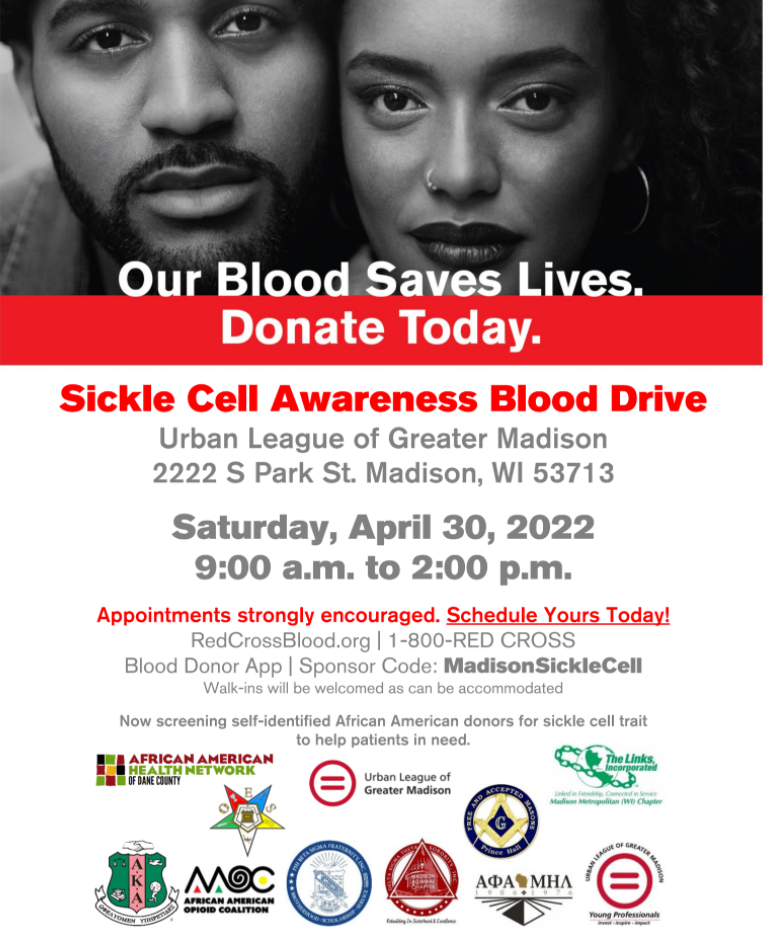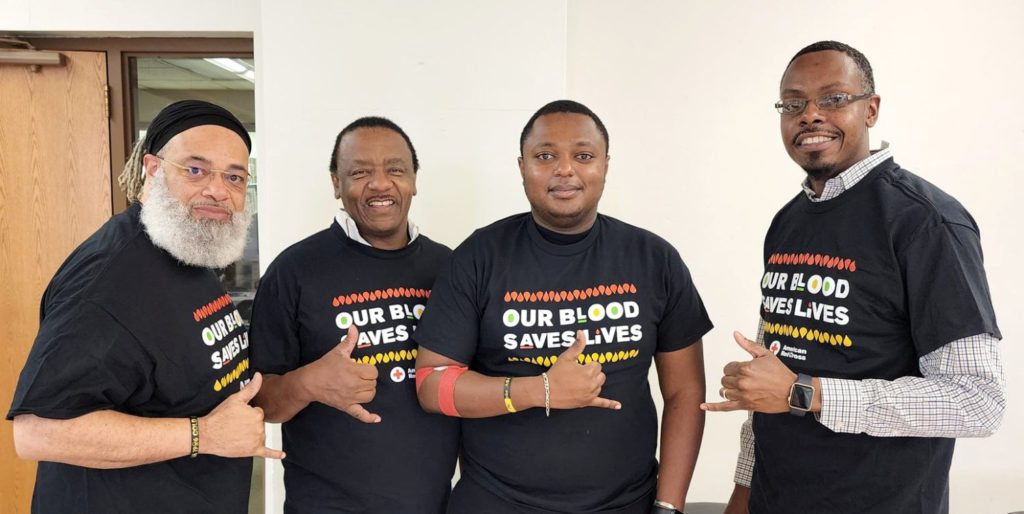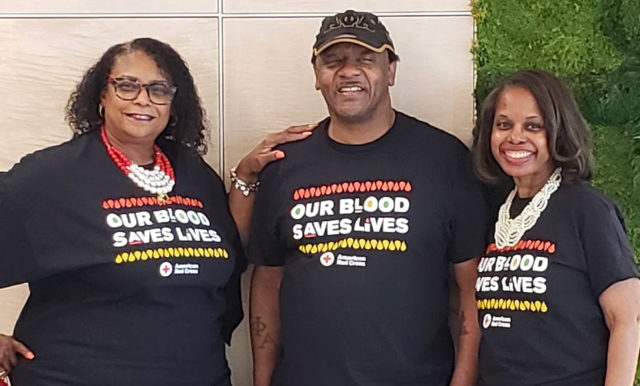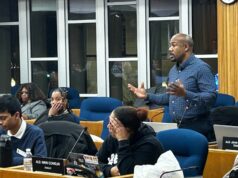Sickle cell disease affects more than 100,000 people in the United States and 20 million people worldwide, impacting African Americans at disproportionate rates. Many sickle cell patients depend on regular blood transfusions from African American blood donors to treat the effects of the disease. But, according to the American Red Cross, the number of African Americans donating blood to the organization has dropped by more than half and donations are needed now to help ensure treatments continue uninterrupted. With that in mind, Urban League of Greate Madison Guild is partnering with American Red Cross and numerous local Black-led organizations to host a Sickle Cell Awareness Blood Drive on Saturday, April 30 at the Urban League of Greater Madison.
“The purpose of this event is to help the Red Cross in getting blood for sickle cell patients but it’s not just for sickle cell patients, but any people that are going to be in any type of trauma,” Bobby Moore, the chairperson for the Urban League Guild’s Sickle Cell initiative. “We started this event because of our friend Martin Lackey, who is a sickle cell recipient that we know well. He was telling us about the pain he was in and the need for blood. We decided to just put things in motion and we got in touch with the Red Cross and tried to make it happen.” 
Moore says at first he didn’t truly understand exactly the impact that sickle cell disease — a group of inherited red blood cell disorders that affects hemoglobin, the protein that carries oxygen through the body — had on patients.
“But since I’ve learned more about it, I’ll be a donor for the rest of my life. They told us that we can donate up to six times a year,” Moore says. “I think that this event will help to educate people to understand how much pain these people are in. We want to make sure that people could go out and donate as much as they can.
“I think that once people figure out that African American people, in particular, really need help with this particular disease and many other traumas, I think that they actually will help,” he adds. “So what we did is we went out and tried to get an army together. We went out and tried to get our faith-based community which is really big in Madison, The Divine Nine [historically African American fraternities and sororities], and we also added to the Order of the Eastern Star – Wisconsin Grand Chapter and the Madison [Metropolitan] Links.”
Other partners in this endeavor include the African American Health Network of Dane County, the African American Opioid Coalition, African American Council of Churches, Mt. Zion Baptist Church, and the Urban League of Young Professionals.
“We have tried to bring the whole community together for this and we figured with all of the organizations that we have, we’re looking to get 60 pints of blood, of which at least 30 are really good,” Moore says. “Hopefully, we get even more than that. This is just the beginning, but we really want to make this first drive really successful.”
American Red Cross Wisconsin Regional Communications Manager Laura McGuire says that 38 percent of the United States population is able to donate blood.
“What we have found is that only about 3 percent actually do. And out of that 3 percent, 4 percent of our numbers are Black donors. So the Red Cross really has the initiative to create awareness for Black donors to give blood,” McGuire tells Madison365. “We just want people to know that donating blood is easy and it’s free and it really helps save lives.”
“I think what really makes this unique and transformational are the number of partners that we have pulled together to pull this off and make it happen,” Rainey-Moore, president of the Urban League of Greater Madison Guild, tells Madison365. “We’re using all the Divine Nines but we’re also using Black-led organizations that may not be part of the Divine Nine but also Black-led.”

The organizations are using the campaign slogan “joined by blood” for Saturday’s Sickle Cell Awareness Blood Drive.
“It implies that we’re giving blood, but that we are also thinking about our relationships with each other,” Rainey-Moore says. “We consider each and every one of us family. And so, really, we’re this family of community members that are working together to solve an issue that is in our community.
“We want to raise awareness about sickle cell, but we also want to raise awareness about the shortage of blood that is needed to help people when they need it, for example, in the operating room,” she adds. “We are accomplishing this through a partnership of many different organizations.”
Those willing to donate blood must be at least 16 years old and at least 100 pounds and in good health and feeling well. You can sign up to donate by clicking here. About half of the African American population has type O positive blood, which is the most transfused blood type in America and is one of the first types to run out during a shortage due to high demand, which is why O positive donors of all backgrounds are needed to maintain a healthy blood supply.
“Our blood is unique in making more matches for sickle cell patients,” says Carola Gaines, vice president of the Urban League of Greater Madison Guild and a member of the Divine 9. “And so not only is there a shortage, but the shortage of our blood that is unique that can save our own people is something that we are hoping that people will see.
“We can do this as a community,” she adds. “We just have to get over those feelings and trepidations that we might have [about giving blood].”
“Blood type is passed down from generation to generation. So we do see pockets of certain types of blood in different ethnic and racial groups,” Roxie Berra, account manager of donor recruitment for the American Red Cross Blood Services, tells Madison365. “So when Carola said that donors who are Black and African American can better help sickle-cell patients and be a better match, it’s because of that.
“So there are different antigens in the blood that match up better. So someone who’s receiving blood a lot of times … like a sickle cell patient … they have a higher chance of reaction to a blood transfusion and so we at the Red Cross look for the best match possible for them,” she adds.
It is suggested that donors get a good night’s sleep the night before giving blood and eat iron-rich foods before donation such as red meat, fish, poultry, beans, spinach, iron-fortified cereals or raisins. The Red Cross will also be providing free health screenings at the event along with a $10 gift card.
“Those who are Black or African American will automatically get a sickle cell trait screening just to help people get an insight into their health to see if they might be carriers of the sickle cell trait, to see if it’s something they can pass on and just to know,” Berra says.
“You can carry the sickle-cell trait without having the disease, and I think that’s something that a lot of people don’t know,” adds Rainey-Moore. “We do have some people that we know that have the trait but don’t have the disease and that’s because it’s being tested in young folks now … but when we were coming up, it wasn’t tested in everybody.”
McGuire says that it is estimated that one in 13 Black or African American babies born in the United States actually does have the sickle-cell trait.
“Our goal is to unmask this disease and bring a light and awareness about the impact that folks who are having sickle cell are struggling with,” Rainey-Moore says. “These are people right here in our community.”
A reception kick-off will be held at the Urban League on Friday night, 4-6 p.m.
“This is the First Red Cross Sickle Cell Blood Drive here in the Madison market and we are just so thankful for our community partners in helping to get this important message out to the public,” McGuire says.
“If a small community like Madison can have all the organizations come and work together, they think it could be a good model for the rest of the United States,” Bobby Moore says. “And I think that nobody likes to be outdone. So I think if a small little community like Madison can get 60 pints there’s no reason a big city like Chicago, California, New York, etc. can basically do the same. So, you know, that’s our plan. That’s what we hope to do.”


































